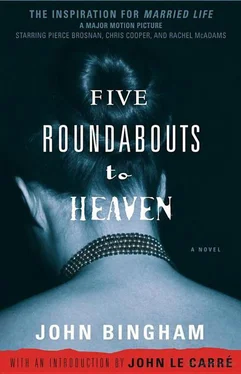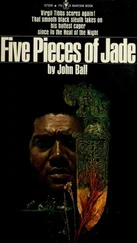John Bingham - Five Roundabouts to Heaven
Здесь есть возможность читать онлайн «John Bingham - Five Roundabouts to Heaven» весь текст электронной книги совершенно бесплатно (целиком полную версию без сокращений). В некоторых случаях можно слушать аудио, скачать через торрент в формате fb2 и присутствует краткое содержание. Жанр: Криминальный детектив, на английском языке. Описание произведения, (предисловие) а так же отзывы посетителей доступны на портале библиотеки ЛибКат.
- Название:Five Roundabouts to Heaven
- Автор:
- Жанр:
- Год:неизвестен
- ISBN:нет данных
- Рейтинг книги:4 / 5. Голосов: 1
-
Избранное:Добавить в избранное
- Отзывы:
-
Ваша оценка:
- 80
- 1
- 2
- 3
- 4
- 5
Five Roundabouts to Heaven: краткое содержание, описание и аннотация
Предлагаем к чтению аннотацию, описание, краткое содержание или предисловие (зависит от того, что написал сам автор книги «Five Roundabouts to Heaven»). Если вы не нашли необходимую информацию о книге — напишите в комментариях, мы постараемся отыскать её.
Five Roundabouts to Heaven — читать онлайн бесплатно полную книгу (весь текст) целиком
Ниже представлен текст книги, разбитый по страницам. Система сохранения места последней прочитанной страницы, позволяет с удобством читать онлайн бесплатно книгу «Five Roundabouts to Heaven», без необходимости каждый раз заново искать на чём Вы остановились. Поставьте закладку, и сможете в любой момент перейти на страницу, на которой закончили чтение.
Интервал:
Закладка:
There was an occasional rustle in the woods around me, and once or twice a whirring of wings, ending in a flutter at tree-top level, as a belated pigeon arrived to roost. Once, too, I heard a thin, shrill squeal, which ended abruptly as the victim died.
A black-and-white cat came softly down a path, paused when it saw me, and stood stock still, and then turned off swiftly and silently into the undergrowth.
Across the moat, in the chateau, a figure moved in the drawing room, and oil lamps were lit, and I saw it was a woman, probably a village woman who helped in the house. Doubtless she was expecting the Americans shortly to return.
In my day, there would have been dancing now.
I saw the room filled with young people in evening dress. Slow-moving old Hans, again, dancing with Mary, the American; big Norwegian Rolf dancing with little blonde Paulette, a daughter of the house; Bob, from Bradford, talking about money with Freddie the bank clerk in a corner. And Ingrid, dressed in her blue-grey dress, sitting on a sofa by herself, her dress matching her eyes, her soft brown hair outlined against the cream walls. Ingrid whom I had lost through my own sad folly. Ingrid, my first love.
I heard the gramophone playing “My Blue Heaven.” Our tune, we called it. So strong was the image which I formed that I half rose from the log upon which I was sitting, to go to her and say: “May I dance?” And lead her on to the floor, and feel her soft hand in mine, and whisper: “Our tune, darling.”
I felt the gentle pressure of her hand, and saw the misty light in her eyes, and heard her say: “I’m glad you asked me in time. Before anybody else.”
I looked for Bartels, but he was not there. Not there any longer. Not on the terrace, either. Nor in his bedroom.
“Bartels!” I whispered in the silence of the wood. “Barty, where are you, old cock?”
But though the picture was becoming clearer in some respects, in others the present was mingling with the past.
Therefore it was natural that 26 February was suddenly upon me, and as my heart beat faster, Bartels should no longer be there; not at the chateau, where he and I were happy together.
For I killed Philip Bartels, and I don’t regret it, either. At least, I don’t think I do.
Chapter 14
Winter or summer, Beatrice woke early, and would lie in bed thinking or reading until about 7.15. Then she would get up and make the early morning tea, and wait impatiently until she heard, first the newspapers arrive, and after that the letters.
In the early days of her marriage she had tried without success to engage Bartels in conversation with her; she would read items from the newspaper, or from letters, express her opinions in her own forthright way, and await his response.
After a while, she gave it up as a bad job.
Bartels would lie half asleep, allowing his cup of tea to grow cold upon the bedside table; occasionally, if he could not avoid it, he would make a monosyllabic reply and then fall half asleep again.
But on the morning of 26 February, he was awake before Beatrice.
For a while he lay in the darkness of that winter’s morning, not moving for fear of awakening her, thinking over what he would do, and, in particular, how he would do it.
It is customary among people of a certain school of thought to say that all murderers must be mentally unbalanced to a greater or lesser degree; poor fellows who are in need of hospital treatment rather than punishment.
I do not consider myself at all unbalanced, and I am quite sure that on the morning of 26 February, Bartels was as sane and cool-brained as anybody else. He had a slightly neurotic fear of moths, dead or alive, and he suffered from a fear of confined spaces, but that is all; and there is not the shadow of a doubt that Philip Bartels came to the decision he did because he was brought up among relations who were so occupied with their own curious interests that they could spare no time to give him the love he needed.
Beatrice could not give it to him; Lorna could. So to Bartels, unable to inflict suffering upon man or woman or beast, there was only one possible way out. The only point he had not decided yet was how exactly he would do it.
He lay in bed thinking, quite calm now, because to a man like Bartels turmoil comes from indecision. He glanced at the luminous dial of his watch, and saw that the time was nearly seven o’clock. He reached up and switched on the light above his bed, and glanced across at Beatrice.
She lay sleeping quite peacefully. He thought dispassionately that this was possibly the last morning when he would see her thus, and he tried to arouse within himself some spark of sentiment.
But the only thoughts that came to his mind were that some day she would have to die, that for her the prolongation of life, perhaps into the feebleness and decay of old age, held no advantages in the long run. For Beatrice to fall asleep, without fear and in the bloom of life, involved no hardship for her.
The alternative for her, as he saw it, was to suffer the loneliness and humiliations of the abandoned wife; he was too fond of her to allow that to happen.
So his thoughts ran, while Beatrice slept on.
At seven o’clock he got up, moving quietly and with stealth, and went into the kitchen and made the early morning tea. He brought the little tray back, and set it on the table by the side of the bed, and gently shook her.
She stirred, and rubbed her eyes and looked at him. Her red hair lay spread out on the pillow. She was wearing a low-cut green nightdress, and the flesh of her arms glowed pink in the light from his bedhead.
She looked young and childlike, tousled with sleep. He thought she looked, indeed, rather beautiful, noting the fact in an unemotional way, and glad that the kind of protective emotional covering which he had assumed prevented the fact from touching his heart.
“Barty? What’s the matter?”
He smiled. “Nothing’s the matter. I just thought I would get the tea, for a change. A kind of treat for you.”
“Good heavens. How nice of you, my dear.”
“Miracles never cease, do they?”
He smiled back at her, and poured out two cups of tea. Beatrice sat up in bed, and took her cup and began to sip it.
“You look rather lovely, you know.”
“Thank you, Barty. Praise indeed.”
“Like one of those advertisements you see in magazines. Drink a cup of Slumbo and get eight hours’ sleep and be a beauty like me.”
He talked to her for a while, about this and that, for he knew she liked to chat in the early morning, and he was particularly anxious that she should enjoy herself that morning.
After a while, he heard the rustle of the morning papers being thrust through the letter box. He went out to fetch them, and when he returned he handed one to Beatrice, and opened one himself, sitting on the side of her bed.
For two or three minutes he sat reading and smoking. Then, his cigarette finished, he reached forward to extinguish it in the ashtray on the table by the side of Beatrice’s bed. As he did so, he noticed the bottle of indigestion powder, and the glass on a saucer, and the teaspoon.
He straightened himself, and stared at the bottle. It was nearly empty. Slowly and carefully he began to think round the idea which had occurred to him, much as a cat will peer and cautiously sniff at a plate of food suddenly presented to it.
“Nothing in the paper,” said Beatrice, continuing to read it just the same. She yawned.
Bartels said nothing. He was trying to remember two things. One was how big a dose Beatrice took of the powder, and the other was how often she took it when she had her periodic bouts of mild digestive trouble.
Читать дальшеИнтервал:
Закладка:
Похожие книги на «Five Roundabouts to Heaven»
Представляем Вашему вниманию похожие книги на «Five Roundabouts to Heaven» списком для выбора. Мы отобрали схожую по названию и смыслу литературу в надежде предоставить читателям больше вариантов отыскать новые, интересные, ещё непрочитанные произведения.
Обсуждение, отзывы о книге «Five Roundabouts to Heaven» и просто собственные мнения читателей. Оставьте ваши комментарии, напишите, что Вы думаете о произведении, его смысле или главных героях. Укажите что конкретно понравилось, а что нет, и почему Вы так считаете.












